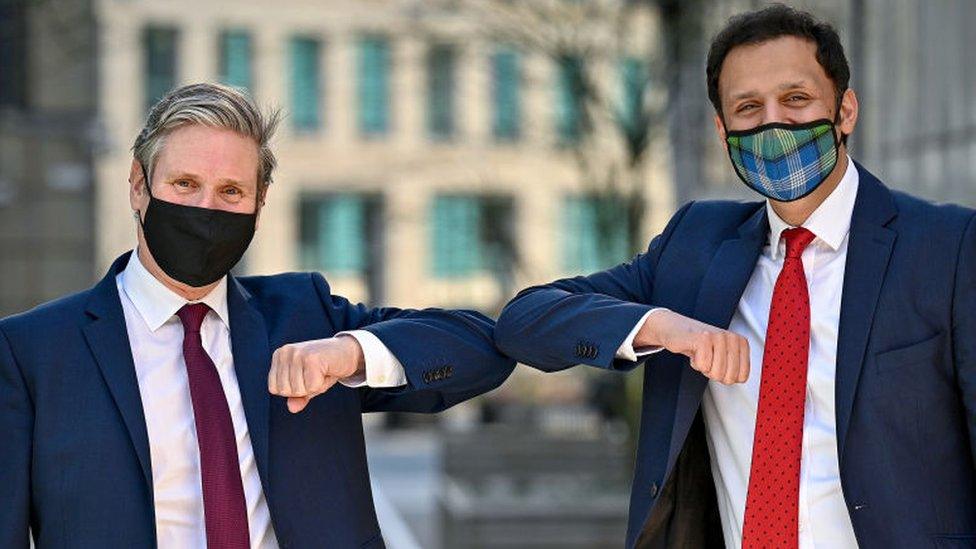Does Boris Johnson's vision work for Scotland's Tories?
- Published
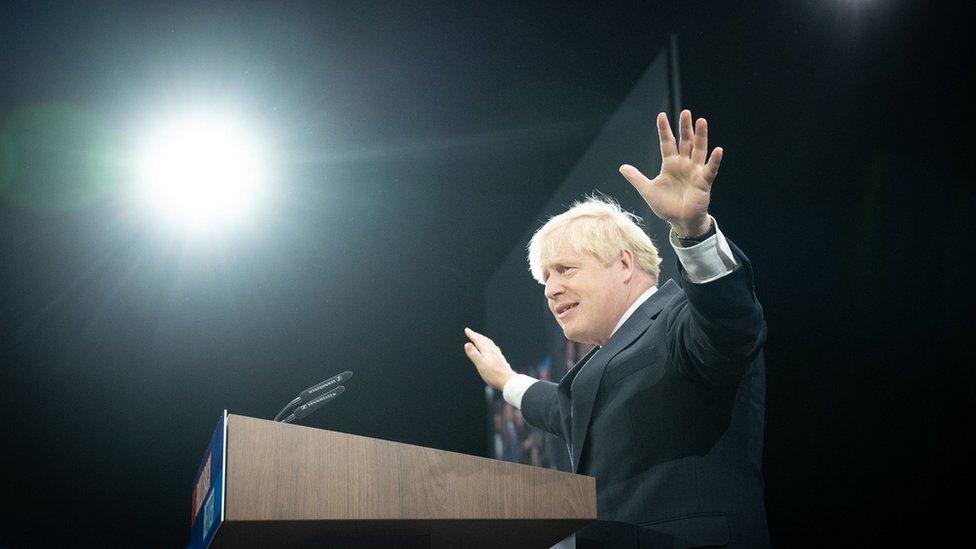
Boris Johnson speaks to an enthusiastic party conference about his levelling up vision
The Scottish Conservatives consolidated second place at Holyrood in May's election, but the party faces questions about its future purpose as Boris Johnson's "levelling up" project reshapes its very foundations.
Do the Tories simply want to frustrate the SNP in opposition, or progress their own policies? And having kept Mr Johnson away from the Holyrood campaign, have they now signed up to his bid to cut into Labour's working class base?
Have we reached Peak Scottish Tory?
The Scottish Conservatives have carved out a comfortable position for themselves as a foil to the SNP. This started in the wake of the independence referendum, when they cemented themselves as the party of No even as the issue started to pull Scottish Labour apart.
The continuing prevalence of binary constitutional debates and tactical voting has suited them fine, just as it has suited the SNP - who are far happier with the Tories as their primary rival.
Having consolidated second place in Scotland, what do the Tories intend to do now?
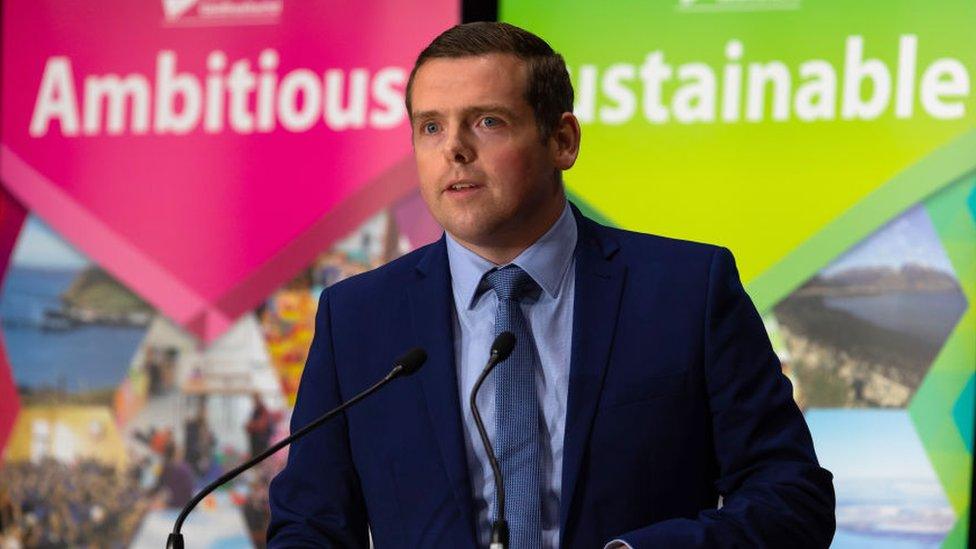
Douglas Ross took on the leadership of the Scottish Conservatives from Ruth Davidson
Douglas Ross has said his ambition is to one day be first minister of Scotland. This may seem a bold statement, but his party actually has more seats now (31) than the SNP did in the term immediately prior to taking office in 2007 (27).
The Tories have a reasonable clutch of target seats, having finished in second place in seven constituencies with a majority of under 10% in May. By that measure, they actually have a more realistic path to making gains than Labour does.
So it is entirely possible that the Conservatives could make gains in future Holyrood elections. However, this doesn't necessarily mean they could actually govern.
When the SNP did so as a minority administration, Alex Salmond bodged together deals with other parties to get his budgets passed - ironically, including the Conservatives. Conversely, there would seem to be few suitors to do a deal with Mr Ross.
Labour would only be undermining their own aspirations to take power at Westminster; the Lib Dems were badly burned by the 2010-15 coalition; and relations with the Greens are at an all-time low after Mr Ross wrote them off as "extremists".
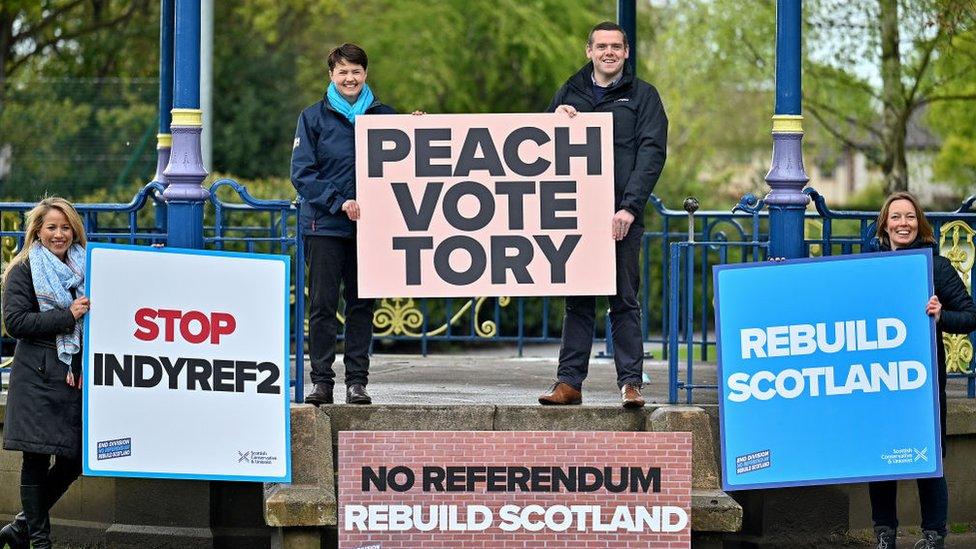
The Tories have capitalised on the constitutional debate to move into second place at Holyrood
Domestic agenda or staunch opposition?
So what are the Scottish Tories going to do at Holyrood, going forward?
Nicola Sturgeon often accuses the party of indulging in "opposition for opposition's sake", of opportunistically planting their flag in direct contradiction to whatever position she has taken.
Given the deal with the Greens has handed the government a majority, there may be little left for the opposition to do but heckle from the side-lines. Mr Ross certainly seems to delight in needling Ms Sturgeon at her weekly question sessions.
That said, the party has set out a range of domestic legislation it would like to see passed, with a "right to recovery" bill, external to get drug addicts into treatment swiftly top of the pile.
Others proposals include bread and butter Tory policies, like a bill defending local councils from centralisation, along with some politicking, like one aimed at sacking disgraced MSPs named after Derek Mackay.
However, there is little chance of any of it happening if the party settles into the admittedly comfortable position of opposition rabble-rousing. There will need to be some effort to build bridges if the Tories are to progress their domestic agenda.
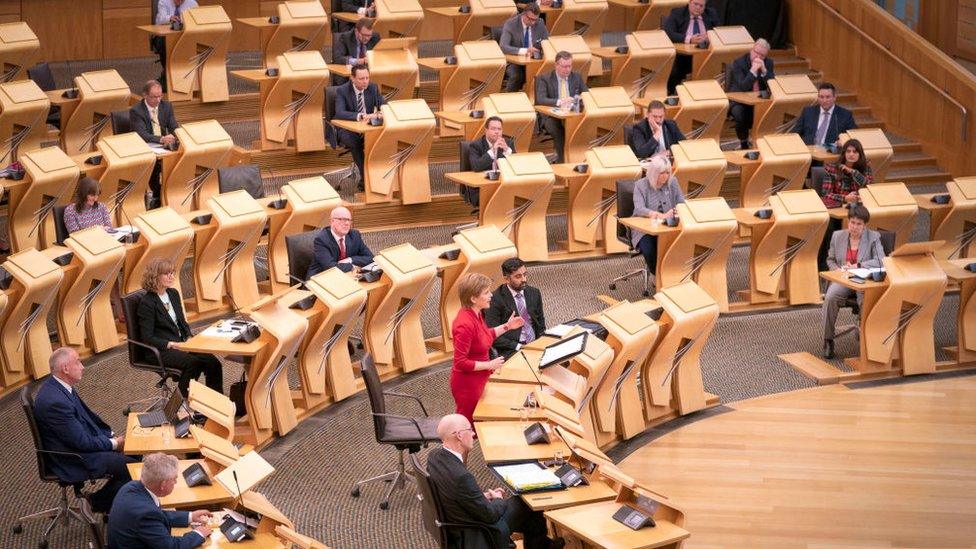
Nicola Sturgeon has accused the Tories of indulging in opposition for the sake of opposition at Holyrood
Boris or bust?
The most glaring question for the Scottish Tories is that of Boris Johnson.
The party opted to keep him as far away from Scotland as possible during May's election campaign, given the prime minister's generally poor personal popularity ratings north of the border.
This contrasts sharply with the images projected from the Tory conference, where delegates hung on Mr Johnson's every gag. It was a reminder that he rose to lead the party because he makes it feel good about itself.
It is not clear if this devotion extends to the Scottish membership - more than half of the party's MSPs preferred Jeremy Hunt for the leadership, external in 2019 - or the electorate more widely.
But more fundamentally, there is a question about Mr Johnson's mission to reshape the Conservative Party and its support base.
There has been much talk of the "levelling up" agenda, of targeting the "Red Wall" in the north of England and winning seats which had been held by Labour for generations.
This has come alongside questions about the ideology of conservativism itself, partly forced by the pandemic - is this a party which is happy to raise taxes and make hefty economic interventions, or one cut from more traditional small-government free marketeer cloth?
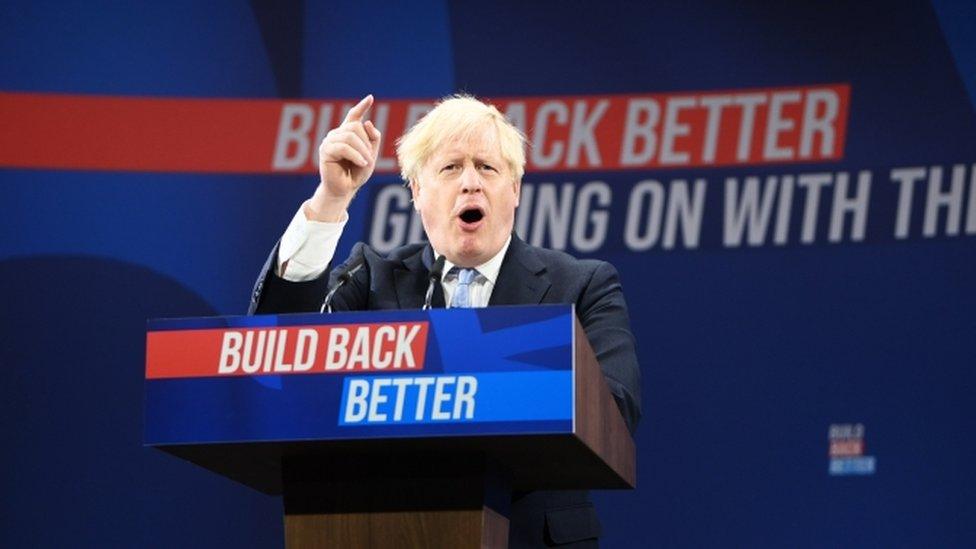
Boris Johnson did not feature in the Scottish Tory election campaign - but he could still have a big influence
Whether this project translates north of the border will be a key test of whether the Scottish Tory revival is built on more than the Union flag and opposition to the SNP.
In a way, the challenge is easier for Mr Ross, given he is not in power. He doesn't need to make tough decisions about balancing the books and the various competing interests which make governing difficult.
However, it is notable that his speech at the Tory conference included claims that he leads "the party of working Scotland" and accusations that Nicola Sturgeon has become "detached from working class communities".
It was a naked pitch to former Labour voters - and a fairly brazen one given the current debate about Universal Credit and the cost of living - straight out of the Johnson playbook.
This suggests that despite the fact Mr Ross distanced himself from the prime minister before he had even ascended to leadership, having quit as a Scotland Office minister in May 2020, he may be happy enough to tread a similar path.
So even if the prime minister remains absent from Tory campaigning north of the border, his influence still looms large in the party's approach.
Related topics
- Published29 September 2021
